5 Digital Marketing Tips for Family Lawyers
While you always want to employ general marketing best practices for your law firm, it is important to also implement focused strategies that work for your key practice areas. If you are a family lawyer looking for a few effective digital marketing strategies for your practice area, then this is the post you have been waiting for.
You already know that you need to employ good legal marketing practices to help your law firm grow. You likely already have a website, know SEO is important, understand the benefits of a good testimonial, and more. However, you also know you want to make sure you are using strategies designed to work for your main practice areas.
For instance, personal injury lawyers often find success in advertising large jury verdicts. But when you are a family lawyer representing clients through a divorce, they probably are less excited by the dollars and cents they may need to pay their soon-to-be-ex-spouse to fully divide their property. So, if you are looking for a few digital marketing tactics just for you as a family lawyer, then keep reading.
What Sets Family Law Apart?

What largely sets family law apart from other specialties is the type of client you are serving. First and foremost, you are generally dealing with someone that is going through a high-stress situation.
While many legal issues are stressful, the stress of family law matters is likely even higher than other run-of-the-mill cases. Instead, these people are dealing with highly emotional situations, such as divorce from their spouses, waging custody battles over their children, coping with the trauma of domestic violence, or facing end-of-life decisions. Sometimes they are managing all of these problems at once. These are clients that often require a greater degree of compassion and empathy than those you deal with in other practice areas. Furthermore, in some circumstances they may even harbor an unusually high level of animosity or resentment towards the opposing party, making resolution of the matter highly contentious.
In addition to the high stress of your client, they are not always going to be repeat customers. You may frequently encounter one-and-done customers. These are clients who likely only need your services once – such as for a single divorce without children or to set up a power of attorney for an aging parent. You may never see these clients again.
This does not mean that you won’t necessarily have frequent fliers. Some people have multiple custody and support issues that pop up throughout their child’s upbringing or may experience various familial issues where you become their go-to attorney.
However, even if you help the same client repeatedly – such as through two, three, four, or more divorces – it is still unlikely that those representations occur in back-to-back months or even years. Instead, there is probably some time between each representation in which you need to find new clients.
Another key distinction between family law and other practice areas is the level of competition within the practice area. Family law matters are common. There is always someone that will need a family law attorney.
This also means that there are lots of lawyers practicing family law, whether they be general practitioners who happen to take family cases or dedicated family law specialists. An abundance of lawyers means increased competition for the same pool of business. You need to be aware of this competition when creating your marketing strategy.
Tip 1: Share Everything You Have To Offer
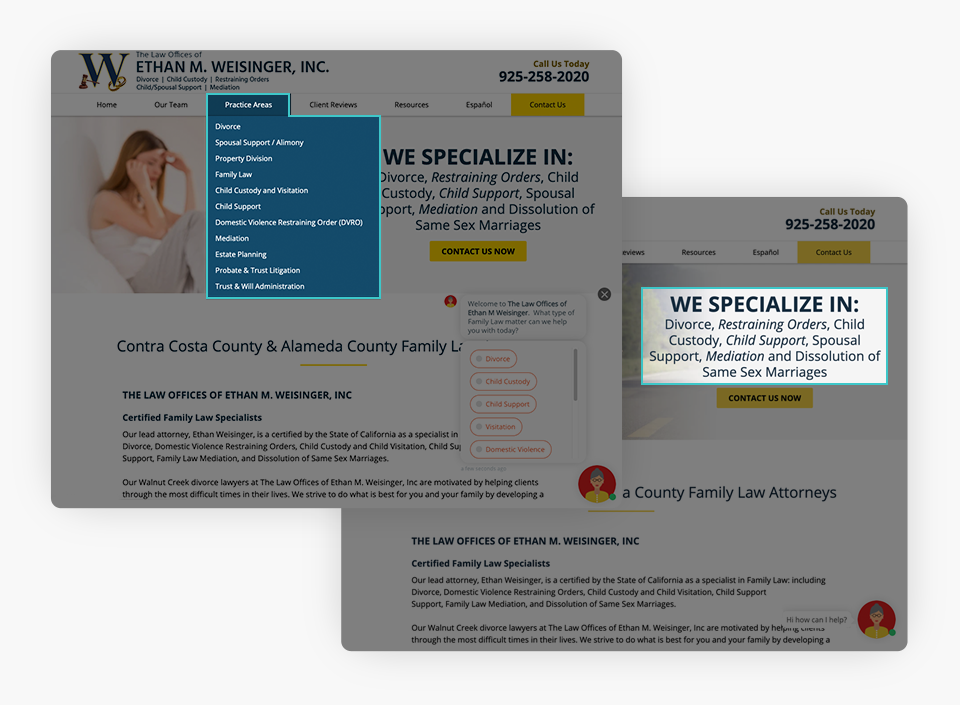
When you develop your website and update your profiles on the various lawyer directories, you want to make sure you are marketing the full range of services you provide. Unfortunately, many lawyers often fall into the trap of assuming that “family law” and a few key services, like divorce and child custody, are enough to reach their potential clients.
However, many clients only think in terms of their specific problem, such as “I need a child parenting agreement.” They are not necessarily thinking of the different types of lawyers who can provide that service.
This means that you need to highlight the many different services you provide. Of course, you want to list the basics, such as alimony, child custody, child support, divorce, etc. However, also think of the more niche issues you handle.
Do you take grandparents’ rights cases or represent non-traditional families? Do you help with adoption matters? Do you handle appeals? Are you a family mediation specialist? Do you write prenuptial agreements? What about powers of attorney or wills? Highlight them all on the services page of your website and all of your attorney profiles.
Tip 2: Prioritize Local Marketing
Local marketing matters for most practice areas but is crucial for family lawyers. When your potential client searches for a divorce attorney, you want her to find you. Your local clients likely want a lawyer near them. They do not necessarily want to drive an hour or two (or more) to get assistance with their family matter.
Start by fully optimizing your Google My Business (GMB) profile. This includes completing your GMB profile set-up and updating your information. Make sure your core name, address, and phone number (NAP) are correct. Link your profile to your website. Choose the correct categories that describe your practice. Set your hours and pick your primary location(s). Update your attributes, such as any Accessibility information, required Appointments, or Health & Safety measures undertaken in response to COVID-19. Finally, add pictures and videos to your listing. Once you have updated this profile, make sure you keep it up to date.
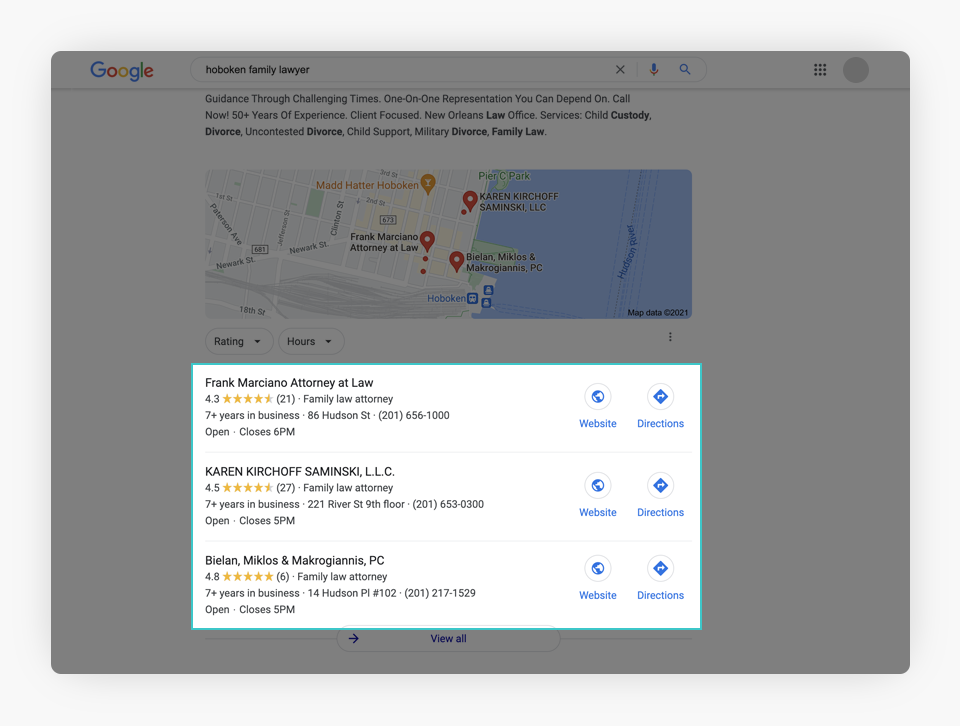
After optimizing your GMB profile, you want to focus on your lawyer directory profiles. Various lawyer directories offer free profiles, such as our Justia Lawyer Directory, and other lawyer directories, including Avvo, FindLaw, LawLink, Lawyers.com, and Martindale. On these directories, you want to ensure that your NAP is consistent with your GMB listing. You also want to complete your profile fully so that it is more useful for your search engine optimization (SEO) efforts, as well as any potential client who views your listing. Remember, vary your biography on these different profiles so that you don’t inadvertently hurt your SEO ranking by creating duplicate content issues.
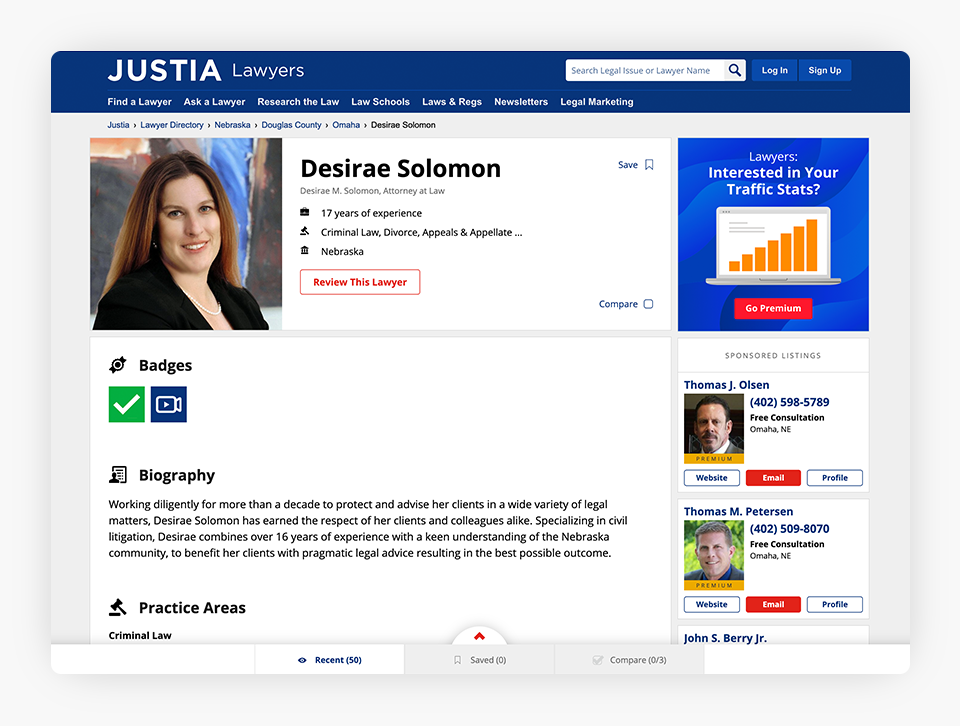
You should also update other local business directories. You can leverage services like WhiteSpark and Yext to help you fully optimize your NAP data in these local business directories across the web.
Make a concerted effort to get reviews and testimonials. These are the new word-of-mouth advertising online. Ninety percent of consumers read online reviews before they decide to visit a business and 88% of consumers trust those reviews like they would a personal recommendation. This means that positive reviews can work wonders in generating leads for your firm.
You will want to solicit Google Reviews, as these will be most prominent in the Google search results. You will also want to keep an eye out for reviews on Bing Places, as well as Yelp. You can get reviews on some lawyer directories, such as the Justia Lawyer Directory and Avvo, and various social media sites.
Once you have started receiving reviews on the different platforms, be sure to monitor your reviews. You will want to flag fraudulent reviews to initiate an investigation process. If you receive negative reviews, you will want to react accordingly to mitigate any potential harm. We have some tips for managing your reviews in this post.
Gathering testimonials for your website is also important. This allows visitors to your site to connect with real clients who have worked with you before. It increases their confidence in your abilities when they see satisfied former clients. Furthermore, these (and your other online reviews) are great for overall digital reputation management purposes.
Tip 3: Build Helpful Content and Answers
You want to build out original, quality content on your website that will be helpful to the types of clients you serve. This means creating evergreen content that helps people faced with divorce, custody issues, and other family law matters in your jurisdiction. You can share this content on practice area-specific sections of your site, landing pages, or even your blog.
This content is good for SEO – which helps you perform better in search engine results – and also helps establish your authority and expertise in this area of the law and promotes trust with potential clients.
Remember, regardless of where you post this content (your site, a blog, or somewhere else) make sure you keep it up to date if the law in your area changes. Otherwise, you will be undermining your efforts to help clients and build trust.
You also should consider adding FAQs to your website if you have not already done so. This is a prime area for answering some of the most common questions you receive as a family attorney. It is likely to be a high-traffic section of your site for people looking for a simple answer (who are great potential clients) and these snippets of information are also good for SEO.
Finally, you will want to participate in various Q&A forums online. Answering questions in these forums help you reach clients who have a legal question now and helps you continue to reach clients searching for similar answers in the future. Similar to creating quality content, giving good answers on Q&A forums allows you to build your authority on the subject matter and boost your reputation.
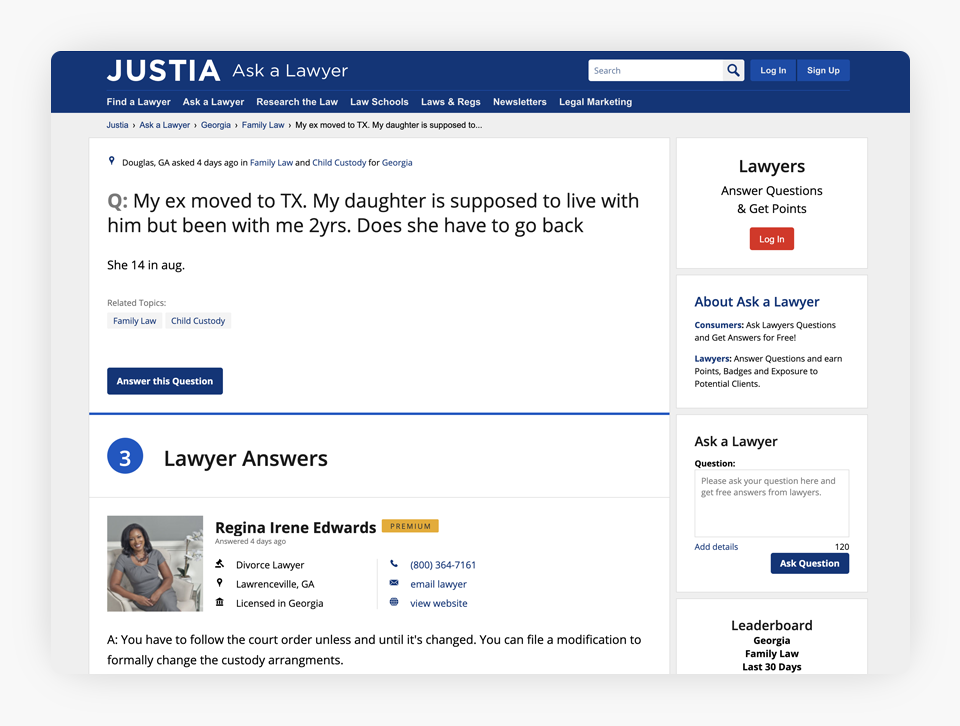
You can answer questions on general Q&A sites, like Quora, as well as dedicated legal Q&A forums, such as Justia Ask A Lawyer and Avvo. For more information on the marketing benefits of Justia Ask A Lawyer, check out our recent Justia Onward post, Using Justia Ask A Lawyer as a Great Tool to Reach Potential Clients.
Tip 4: Leverage Paid Ads
As discussed above, your clients need to be able to find you when they are looking for a family lawyer. This means you are shooting for first-page visibility on Google.
You know there are multiple ways to appear on that first results page of Google: the local pack, the organic listings, and, of course, paid ads. While you can prioritize SEO in an effort to increase your organic ranking and can implement strategies to help your performance in local search, only paid ads to allow you to offer money in exchange for the opportunity to get that top spot.
Furthermore, the Google results page seems to consistently have an increased percentage of paid ads relative to organic search visibility. Even if you otherwise have great organic visibility, adding paid ads to your marketing plan helps you adjust your marketing strategy to this reality.
LSAs (Local Services Ads) are sponsored advertisements that appear at the top of the search results. These relatively new ads have the benefit of achieving the “Google Screened” designation and incorporating a law firm’s Google reviews. Another unique benefit of LSAs is that they are pay-per-lead, instead of pay-per-click (PPC). This means you only pay when you get a phone call or text message contact from your ad. With LSAs, you can decide to target states, counties, cities, or individual zip codes.
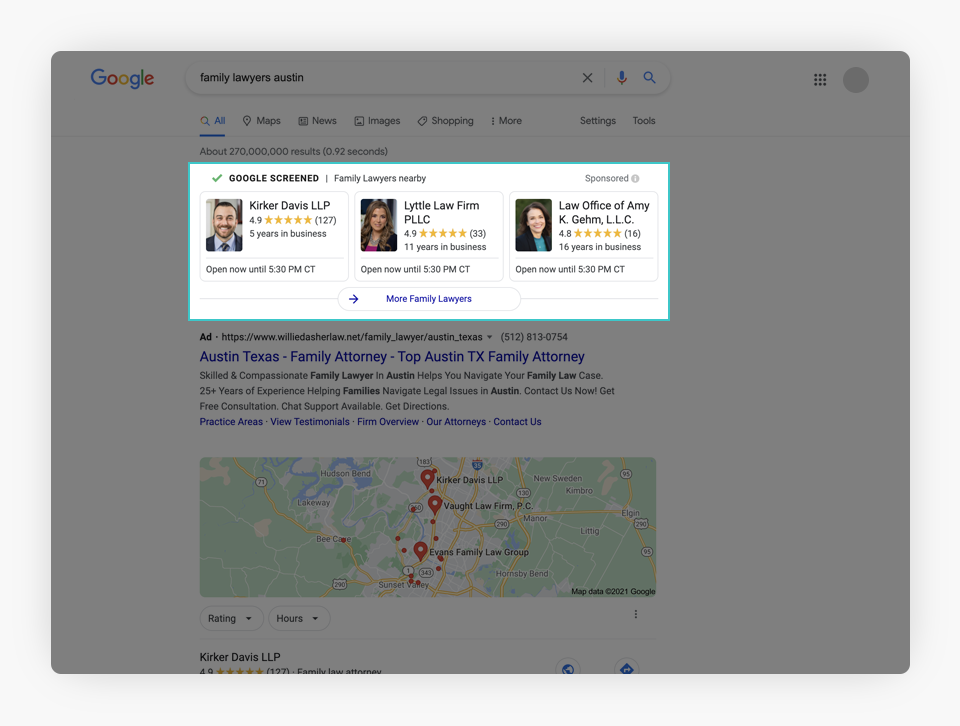
You can also leverage PPC ads to reach more clients. These are the ads that display the above search results but after any LSAs. Notably, LSAs do not appear for all search terms, so traditional PPC Ads may sometimes appear in the top spot of the search results.
To set up a PPC campaign, you will not only need to develop ad text and landing pages and optimize the campaign but also need to choose keywords that you will bid on. Each time someone searches for those words, a behind-the-scenes auction will occur to determine which ads are shown to the searcher.
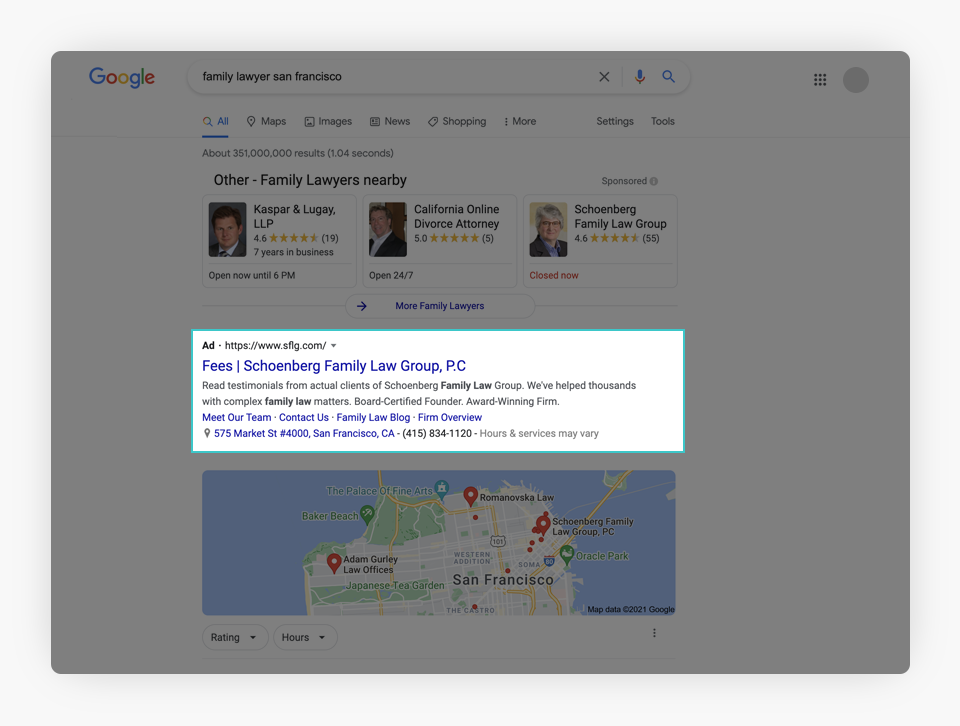
You likely want to bid on the keywords that most directly describe your practice, such as a family lawyer. However, you do not want to stop there. In family law, you are likely to have potential clients that do not necessarily think of the lawyer they need as a family lawyer. Instead, these clients are thinking through a narrower lens.
For example, if your potential client has a child custody issue, they may search for a family lawyer. However, they are also very likely to search for a custody attorney. If someone needs a divorce, they are likely to Google the term “divorce lawyer”. Thus, you want to make sure you think beyond just “family lawyer” and bid on keywords that more closely describe the common issues you deal with.
You can also reach more local clients with your search ads by targeting them within a certain radius of your office or defining narrow geographical regions that you would like to reach while excluding locations that are outside of the sphere in which you practice.
Tip 5: Make Contacting You Easy
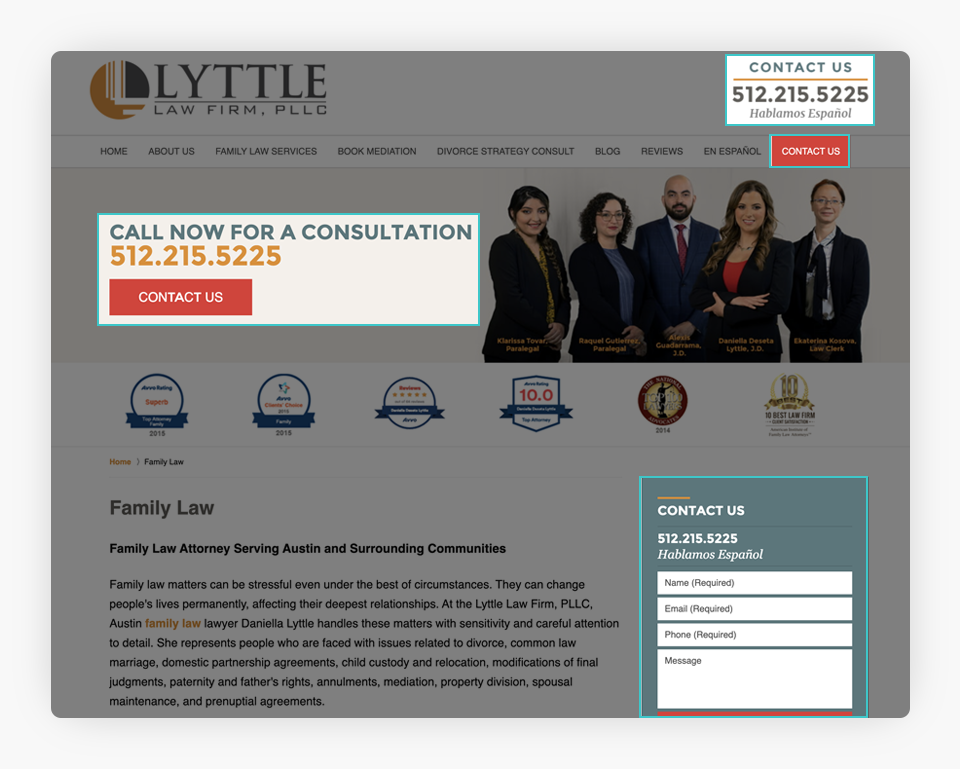
You want to ensure that it is very easy for your potential clients to contact you. When they decide they are ready to call a family law attorney, you do not want them to reach out to a competitor.
Make sure your NAP is consistent and accurate across your entire digital presence, from GMB to social media, directory profiles, and your website. You do not want a potential client to find an out-of-date or disconnected phone number when they want to call you now. Also, if you offer extended hours where someone is available by phone this is a great benefit to promote to potential clients.
Consider implementing a chatbot or live chat form on your website. This helps potential clients feel like there is someone they can talk to now who is ready and willing to help them start working towards a resolution.
Make contact forms prominent in various locations on your website. You can also include a Call to Action (CTA) on every page of your website. This CTA can be a small button in the navigation or some other prominent place that says something as simple as “Contact Us” and links to a contact form or allows your phone number to pop up for a mobile user when clicked.
Consider including a contact form (or perhaps a V-Card) on the biography pages of your law firm website. If a potential client decides your law firm is a good fit for his matter after reviewing the background of a certain attorney, then it is easy for him to reach out at that time.
Remember, if you include actual email addresses on your website, you are increasing the odds that you will receive spam at your law firm account.
Finally, consider offering free consultations or inexpensive strategy sessions where you can discuss the core legal matter facing your potential client. These types of meetings grab the attention of prospective clients who are still unsure about hiring an attorney. Having this type of personalized session is more likely to convert them from a prospect to a new client. Advertise these sessions clearly on your website and directory profiles. Bonus points if you offer these consultations via video conferencing!
Final Thoughts: Why Do You Care?
No one wants to waste their time and money on meaningless marketing. Instead, you want to be sure you are allocating your digital marketing resources to strategies that are tailored for your firm. Marketing your family law practice has a slight nuance to it that makes it different from marketing other types of law firms.



